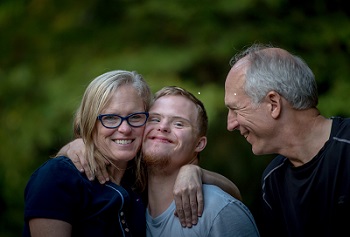 A Family Toolkit: Pediatric-to-Adult Health Care Transition – A toolkit from Got Transition and its National Family Health Care Transition Advisory Group provides resources for youth and families to help youth assume more independence in taking care of their own health and using health services. Find information on whether a child is ready for transition, a transition timeline, questions to ask the doctor, and what turning 18 means for one’s health, as well as links to webinars that discuss the toolkit and additional resources.
A Family Toolkit: Pediatric-to-Adult Health Care Transition – A toolkit from Got Transition and its National Family Health Care Transition Advisory Group provides resources for youth and families to help youth assume more independence in taking care of their own health and using health services. Find information on whether a child is ready for transition, a transition timeline, questions to ask the doctor, and what turning 18 means for one’s health, as well as links to webinars that discuss the toolkit and additional resources.
Youth with Special Health Care Needs: Promoting Successful Health Transition to Adulthood
As a primary health care provider you can help youth with special health care needs and their families through a successful transition to adult health care and other services. Discuss with youth and families the best time to transition to an adult health care provider. Offer recommendations of adult-care physicians and specialists who understand special health care needs.
Encourage Youth to:
- Know their medications
- Schedule their therapy appointments
- See medical professionals alone, as appropriate
- Be active in decision-making about their health care
- Learn about medical problems & identification of symptoms needing medical attention
- Talk with other youth with similar health problems
- Be an expert about their disability or illness
Encourage Families to:
- Respect the youth’s privacy
- Recognize the youth’s need for increasing independence and separation
- Realize that all youth, including those with special needs are vulnerable to early sexual activity, pregnancy, substance abuse, sexual abuse, exploitation, and other at-risk behaviors
- Address sexual issues early and often, and in a way the youth can understand
- Gradually move from parent decision-maker to that of a consultant
- Talk with other families whose youth have transitioned to adulthood
Additional Resources:
- Health Care Provider pages – Customizable tools based on your practice setting- 1) for youth transitioning to adult care, 2) youth transitioning to an adult approach to health care without changing providers and 3) Integrating young adults into adult health care.
- Health Care Transition Resources – resources in English and Spanish to help families with a smooth transition.
Coding and Reimbursement Tip Sheet for Transition from Pediatric to Adult Health Care
Created by the American Academy of Pediatrics and Got Transition, a cooperative agreement between the Maternal and Child Health Bureau and the National Alliance to Advance Adolescent Health, this 2022 tip sheet provides an overview of new and innovative payment models that support the services involved in transition from pediatric to adult care. Included are sample CPT codes, descriptions, and payment for same.
AASPIRE Healthcare Toolkit –Primary Care Resources for Adults on the Autism Spectrum and their Primary Care Providers
This web site has information and worksheets for healthcare providers, adults on the autism spectrum and their supporters. It focuses on primary healthcare, or healthcare with a regular doctor. The resources on this site are meant to improve the healthcare of autistic adults. They were made by the Academic-Autistic Spectrum Partnership in Research and Education (AASPIRE) through a series of research studies funded by the National Institute of Mental Health.
Supporting the Health Care Transition From Adolescence to Adulthood in the Medical Home
Patience H. White, W. Carl Cooley, TRANSITIONS CLINICAL REPORT AUTHORING GROUP, AMERICAN ACADEMY OF PEDIATRICS, AMERICAN ACADEMY OF FAMILY PHYSICIANS and AMERICAN COLLEGE OF PHYSICIANS. Pediatrics November 2018, 142 (5) e20182587; DOI: https://doi.org/10.1542/peds.2018-2587
The tenets and algorithm of the original 2011 clinical report, “Supporting the Health Care Transition from Adolescence to Adulthood in the Medical Home,” are unchanged. This updated clinical report provides more practice-based quality improvement guidance on key elements of transition planning, transfer, and integration into adult care for all youth and young adults. It also includes new and updated sections on definition and guiding principles, the status of health care transition preparation among youth, barriers, outcome evidence, recommended health care transition processes and implementation strategies using quality improvement methods, special populations, education and training in pediatric onset conditions, and payment options. The clinical report also includes new recommendations pertaining to infrastructure, education and training, payment, and research.
The Youthhood Website
Sponsored by the National Center on Secondary Education and Transition at the University of Minnesota. Free, interactive, and dynamic Web site that young adults and their teachers, parents, and mentors can use to plan for life after high school.



